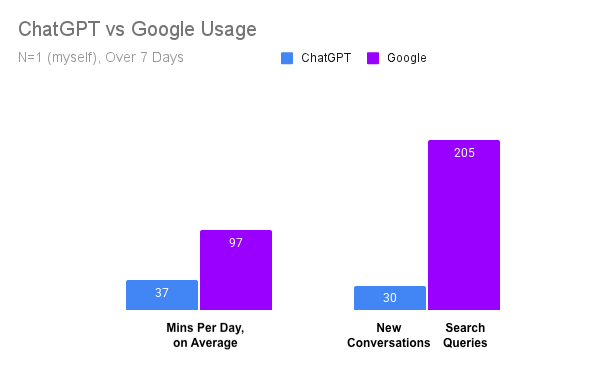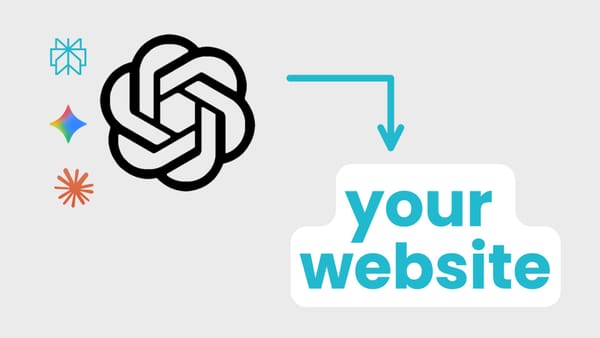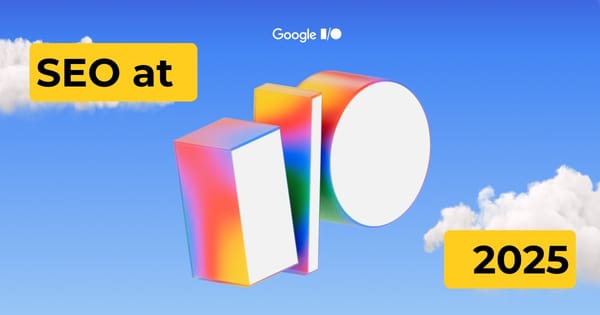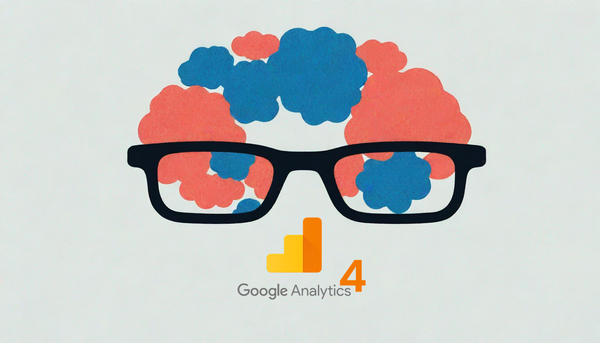How do People Use Google vs ChatGPT?

In you're a founder or webmaster, you should be thinking about how to increase the visibility of your product or service in the age of LLMs and generative AI. Perplexity, a generative search engine, is one of the fastest growing startups of all time, hitting $100M in revenue in less than three years of doing business (CNBC, 2025). ChatGPT, Claude, and Google's own Gemini now support web search and refer traffic to third-party websites via citations. According to a 2024 study by Mckinsey, 71% of enterprises have adopted generative AI, up from 33% in 2023 (1). AI is undeniably changing the way that people search for product recommendations, research businesses, and browse content.
Understanding this shift in behavior impacts how you should optimize your website and shape your content strategy. I'm calling this new field GEO or "Generative Engine Optimization," a term coined in this 2024 paper by Aggarwal et al (2). In the new age of Generative Engine Optimization ("GEO"), understanding user behavior on chatbots can give you an edge over other brands.
Are People Using ChatGPT More than Google?
In 2025, I feel like I'm using ChatGPT a lot more than I'm using Google Search. I have changed the app on my iPhone's footer from Safari to ChatGPT and regularly use ChatGPT for things I used to use Google for, like finding recipes and travel research, plus dozens of use cases that I didn't use Google for. I also feel like I spend longer in ChatGPT, having conversations and iterating on drafts.

I dug into the data and saw that, in reality, I'm still using Google more than ChatGPT. Last week, I spent an average of 37 minutes on ChatGPT, whereas I spent 97 minutes in the Safari browser. I had 30 new conversations with ChatGPT and had 205 Google searches in the same time period. Neither of these is a perfect metric, but it does represent that even for an AI-forward founder/CEO, I'm still heavily using Google.

So, the short answer is: No, people are not yet using ChatGPT more than they are using Google. But everyday ChatGPT gets better, replacing more and more of the use cases I trust Google for. In this article, I want to share a vision of search behavior in the future, so that content marketers can craft a long-term strategy and invest in the right areas for SEO vs GEO going forward.
What Do People Do on ChatGPT that they didn't on Search?
In the future, Google Search will still exist. Whereas chatbots are assistive, Google is more like a librarian, gathering resources out there instead of giving you the answer. Here are some search behaviors that users are more likely to use ChatGPT for rather than Google.
Personalized recommendations
People write longer prompts into chatbots like ChatGPT than they do into Google Search. They might give much more context to personalize the recommendations to their specific need. For example, searcher's might ask for health advice by uploading their blood test results or full set of symptoms. For ChatGPT power users, the platform comes to know more about you through your prompt history, making the recommendations increasingly personalized over time.
Takeaway: Ask your customers or community to write about how they use your product. Spend time on niche use cases and write ups which apply to niches of people.
Subjective recommendations
Because LLMs respond with a long-form narrative, searchers are more likely to ask for subjective advice, like "Which is better of these two options?" or "What movie should I watch?"
Takeaway: Write long-form pieces about how your product compares to competitors, with in-depth technical specs. Use fluent language to describe why your product is the best. Ask partners, influencers, customers, and affiliates to make videos that chatbots can point to for a video answer.
Technical tutorials and debugging info
I ask ChatGPT for advice when I run into errors or am learning a new software system. Often, ChatGPT seems to be the best possible source for IT help, debugging, or technical instructions.
Takeaway: Now is the best time to invest in your developer documentation and help center. ChatGPT thrives on fluent technical instructions to provide support to new and current customers.
Multi-Facetted Research
ChatGPT is the ideal assistant for a long-form or multifaceted agenda, plan, or outline. Since it can search the web, take uploaded information as data, and with the new Deep Research mode pull many complex sources together, ChatGPT helps searchers with research that involves many factors, options, and sources.
Takeaway: Talk about how your product fits into a larger possible plan. Cite experts who recommend your product and include data or statistics to show why your product should be best practice.
What are people still using Google Search for, in the age of LLMs?
Importantly, Google Search is still an important engine for driving business, and SEO is not dead. For our website, Kapwing, we have more traffic year over year in 2025 than we did in the previous 12 months, despite the rise of generative AI. Google is still a better search engine for queries where visual information plays a role, and it's a critical site for navigation and truth-finding.
Visual browse queries
Google has image search plus websites like Canva, Pinterest, and Freepik which are better destinations for visual browse than ChatGPT. Chatbots like ChatGPT have gotten better at referencing images and videos, but Google still reigns for queries related to aesthetics, colors, fonts, celebrities, and places.
Factual information
If you want to calculate "1200/7", what streaming services carry Godzilla Minus One, or who won the Amazing Race, Google is a great source with less risk of hallucination. Searchers trust it to provide truthful information or return no results when the truth does not exist. Google is also useful when you need to reproduce a specific passage or quote.
Navigation
If a user is looking to go directly to a specific website like "Trip Advisor," they likely still go to Google. ChatGPT sometimes makes up links, doesn't handle spelling mistakes or auto-complete, and performs slower when it does a web search, so it's unlikely to be the go-to engine for navigating the web.
Specific names, addresses, and people
When searching for the name of something specific, you're somewhere between navigation and factual information. Many of my personal Google Searches for the last week are trying to find someone's LinkedIn or company Crunchbase profile.
Takeaway: Content marketers should continue to invest in long-tail SEO strategies that reference specific identifying information, like the name of a product line, address, . For example, Kapwing's pages
Conclusion
In 2025, the long studied field of SEO has been overshadowed by the new field of Generative Engine Optimization, or GEO. Follow along on this blog for more tips about how to increase the visibility of your website on ChatGPT and other chatbots.
Citations
(1) Singla, A., Sukharevsky, A., Yee, L., Chui, M., & Hall, B. (2025, March 12). The state of AI: How organizations are rewiring to capture value. McKinsey & Company. https://www.mckinsey.com/capabilities/quantumblack/our-insights/the-state-of-ai
(2) Pranjal Aggarwal, Vishvak Murahari, Tanmay Rajpurohit, Ashwin Kalyan, Karthik Narasimhan, and Ameet Deshpande. 2024. GEO: Generative Engine Optimization. In Proceedings of the 30th ACM SIGKDD Conference on Knowledge Discovery and Data Mining (KDD ’24), August 25–29, 2024, Barcelona, Spain. ACM, New York, NY, USA, 12 pages. https://doi.org/10.1145/3637528. 3671900



